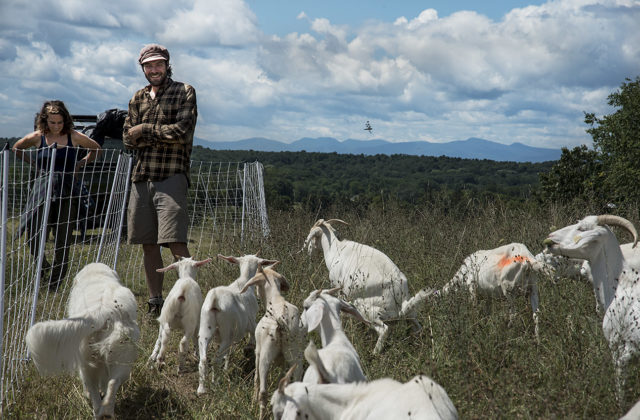Faces at the Farmers Market
Woven Stars Farm, Food With a Conscience
By Wiley Wood
On a typical day, Emerson Martin and Lizzie Galeucia bring pasture-raised eggs, raw honey, oyster mushrooms and heirloom tomatoes to the farmers market in Norfolk. In the fall they will add frozen cuts of lamb and goat. Diversity is part of their plan, and keeping a light footprint, and joining the elements of their farm into a harmonious whole.
The couple lease 40 acres of farmland in Ghent, N.Y., a community that blends traditional agriculture with small-scale, organic, sustainable food production. Martin and Galeucia’s Woven Stars Farm belongs squarely in the second camp.

Emerson Martin unloads the bags of straw on which his next crop of oyster mushrooms will grow, while LizZie Galeucia pokes air holes in the bags’ sides.
On a recent Sunday, they were unloading long, narrow bags of chopped wheat straw from an all-terrain vehicle and carrying them into their high-tunnel greenhouse. The straw, which had been soaked the night before in a bath of hydrated lime and mixed with mushroom spawn, would form the substrate for a new crop of oyster mushrooms.
As he poked air holes in the sides of the bags, Martin explained that the growing medium is normally autoclaved or heat-treated to make it sterile and allow the oyster mushroom’s mycelia to colonize it before other fungi in the environment take over. The lime bath, by raising the straw’s pH level, performs the same function, but lets the mushrooms grow in a more natural, non-sterile medium.
“They’re like batteries,” says Martin, stacking the bags in the greenhouse. The straw’s organic matter is consumed by the mushroom, gradually becoming depleted. “The whole bag turns white as the mycelia spread,” says Martin, “and only when all the space is filled does the mushroom start to fruit.”

The mycelia-filled bags hang in the moist air of the fruiting shed like sausages.
At that stage, the bags are moved to the fruiting shed, where they hang in rows like sausages while a fine mist sprays over them and the mushrooms form. The whole process takes about three weeks from start to finish.
In a field near the greenhouse, surrounded by a portable electric fence, stands a large chicken coop on wheels. The flock, a mix of Rhode Island reds, golden comets and jet-black australorps, is mostly sheltering from the midday sun under the structure. Occasionally, one of the hens darts out after a passing cricket or to peck at a tray of organic grain. When Martin, who is carrying a bruised tomato from the greenhouse, tosses bits of it into the pen, the hens come running, squabbling for shards of the sweet fruit.
Every week, the coop is moved to a fresh part of the field, which the chickens will feed on and leave fertilized.

The mushrooms begin to fruit, a stage known as “pinning.”
The sheep and goats on Woven Stars Farm, like the chickens, are raised in movable pens—enclosures made of light, solar-powered electrical fencing. Bred for meat, both herds are small, numbering about a dozen breeding females and their offspring, plus a male, and both herds are pastured at the moment on neighbors’ land.
As we approach the sheep, a large white dog comes bounding toward Galeucia. This is Arya, who lives with the herd full-time and protects them from coyotes. Galeucia makes a high-pitched call, “Sheep, sheep, sheep!” and the herd, which has been resting in the shade, comes trotting toward her. They are a hardy breed, Katahdins, that develops a thick coat in the winter and sheds it in the spring, giving them a sleek appearance.
The owner of the land, Martin explains, is supportive of farmers in the area, and this lush strip of grass along a bend in the driveway would only be mowed if the sheep weren’t there.
Martin, who studied environmental design at the University of Massachusetts, sees Woven Stars Farm as making productive use of marginal land, in the interstices of an agricultural area in transition, and bringing improvements to it.

The sheep, coming to Galeucia’s call, live in a grassy roadside pen on a neighbor’s land.
The goat herd is pastured in an abandoned hill-top field that has been recently invaded by woody shrubs and weeds. The goats eat down many of the shrubby plants and leave the soil enriched, as they are cycled through different sections of the field.
“We sell lots of live goats for the ethnic market,” says Galeucia, A buyer from New York City who scours the Hudson Valley for live goats is a client of theirs. And on a recent day, a Mexican buyer had bought five goats on the hoof for a large family celebration.
Woven Stars Farm also sells nuclear hives from their beekeeping operation in the spring and The couple, whose products are sold at the Hawthorne Valley Farm Store in Ghent and served at Elixir, a restaurant in Great Barrington, are happy for the weekly outlet at the Norfolk Farmers Market. “Emerson, who grew up in Sheffield, Mass., had heard good things about it,” says Galeucia, who adds that they enjoy the company of the other vendors and Norfolk has been a good fit for them.
This is the first in a series of articles on vendors at the Norfolk Farmers Market.
Photos by Bruce Frisch.


Interwoven farm in Illinois comes up in all google searc
May change website to Taconic valley s Interwoven sustainable farm
Oyster mushroom source in Hawthorne v ny
Organic Leutin rich eggs by Lizzy
Goat Free range chicken and lamb by Emerson the livestock farmer